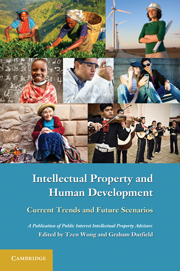Book contents
- Frontmatter
- Contents
- Boxes
- Contributors
- Foreword
- Preface
- Acknowledgements
- Acronyms and abbreviations
- Overview
- 1 Intellectual property through the lens of human development
- 2 Intellectual property and medicine: Towards global health equity
- 3 Food security and intellectual property rights: Finding the linkages
- 4 Trends and scenarios in the legal protection of traditional knowledge
- 5 Traditional cultural expressions: Preservation and innovation
- 6 Copyright and capability for education: An approach ‘from below’
- 7 Knowledge and education: Pro-access implications of new technologies
- 8 Cultural diversity and the arts: Contemporary challenges for copyright law
- 9 Scenario planning on the future of intellectual property: Literature review and implications for human development
- Appendix A Capability, opulence and utility1
- Appendix B Exploring alternative, collaborative models of innovation for medicines and vaccines1
- Appendix C Strategies and laws to promote traditional medicinal knowledge1
- Appendix D Educational use exceptions to copyright: A comparison among selected jurisdictions1
- Appendix E Copyright and contemporary art: A case study
- Index
Appendix A - Capability, opulence and utility1
Published online by Cambridge University Press: 05 June 2012
- Frontmatter
- Contents
- Boxes
- Contributors
- Foreword
- Preface
- Acknowledgements
- Acronyms and abbreviations
- Overview
- 1 Intellectual property through the lens of human development
- 2 Intellectual property and medicine: Towards global health equity
- 3 Food security and intellectual property rights: Finding the linkages
- 4 Trends and scenarios in the legal protection of traditional knowledge
- 5 Traditional cultural expressions: Preservation and innovation
- 6 Copyright and capability for education: An approach ‘from below’
- 7 Knowledge and education: Pro-access implications of new technologies
- 8 Cultural diversity and the arts: Contemporary challenges for copyright law
- 9 Scenario planning on the future of intellectual property: Literature review and implications for human development
- Appendix A Capability, opulence and utility1
- Appendix B Exploring alternative, collaborative models of innovation for medicines and vaccines1
- Appendix C Strategies and laws to promote traditional medicinal knowledge1
- Appendix D Educational use exceptions to copyright: A comparison among selected jurisdictions1
- Appendix E Copyright and contemporary art: A case study
- Index
Summary
The conceptual foundations of the capability approach can be found in Sen's critiques of traditional welfare economics, which typically conflate well-being with either opulence (income, commodity command) or utility (happiness, desire fulfilment)…Like Adam Smith, Sen (1983) emphasizes that economic growth and the expansion of goods and services are necessary for human development. However, like Aristotle, he reiterates the familiar argument that ‘…wealth is evidently not the good we are seeking; for it is merely useful and for the sake of something else’ (Sen 1990, p. 44). In judging the quality of life we should consider what people are able to achieve. Sen then observes that different people and societies typically differ in their capacity to convert income and commodities into valuable achievements. For example, a disabled person may require extra resources (wheelchairs, ramps, lifts and so on) to achieve the same things (moving around) as an able-bodied person…In comparing the well-being of different people, not enough information is provided by looking only at the commodities each can successfully command. Instead we must consider how well people are able to function with the goods and services at their disposal.
Sen also challenges the welfare or utility approach, which concentrates on happiness, pleasure and desire fulfilment…Following Rawls he recognizes that utility does not distinguish between different sources of pleasure and pain or different kinds of desires (Sen 1984, p. 308; Rawls 1971, pp. 30–31). In particular, utility fails to discriminate against offensive tastes…More fundamentally, Sen points out that there is more to life than achieving utility: ‘Happiness or desire fulfilment represents only one aspect of human existence’ (Sen 1984, p. 512). While it is important to take note of utility, there are many other things of intrinsic value (notably rights and positive freedoms) that are neglected by the welfare approach (Sen 1987, p. 8; 1992, p. 54; 1999, p. 62)…
- Type
- Chapter
- Information
- Intellectual Property and Human DevelopmentCurrent Trends and Future Scenarios, pp. 367 - 368Publisher: Cambridge University PressPrint publication year: 2010



